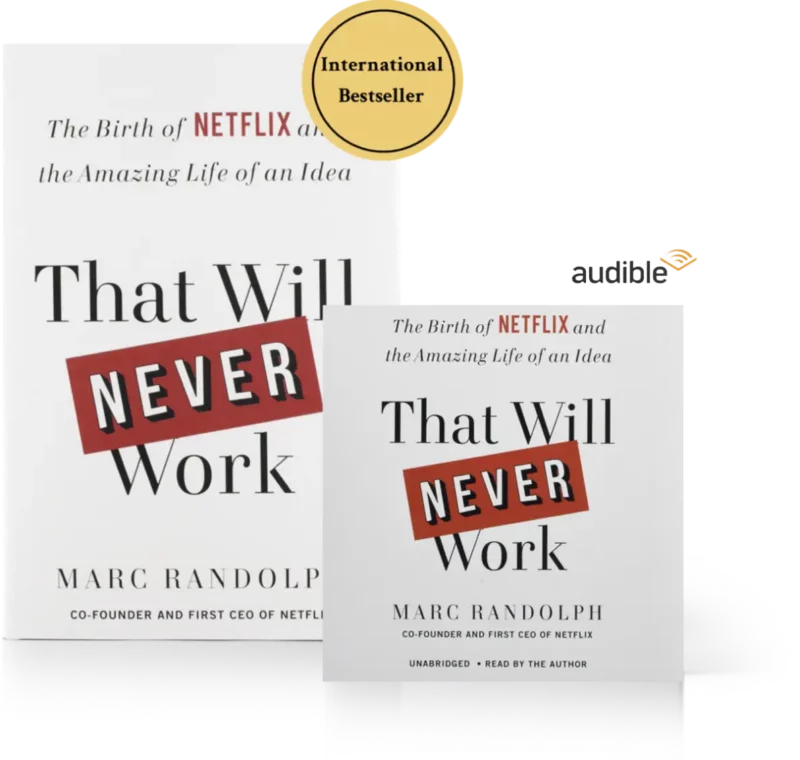The Courage of the Early-Stage Entrepreneur.
And why It’s the most important characteristic for any founder.

I’ve been talking a lot about courage recently. I’m starting to conclude that it’s one of the most important characteristics for any entrepreneur.
I wrote last time — and in my book That Will NEVER Work — about how Netflix walked away from our lucrative business of selling DVDs to focus everything on rental. If you know me, you’ve heard me tell that story dozens of times. You’re probably sick of it. But it’s a great example of a company having the courage to double down, walk away from a likely but mediocre success, and bet it all on the unlikely chance of a huge win.
At the time, walking away from 95% of our revenue to chase a dream probably looked totally irrational to the outside world. But sometimes that’s the nature of pursuing unlikely opportunities. You have to do things that will make other people think you’re an idiot.
Trust me, I should know. Netflix did it countless times.
Here’s an example. Early on at Netflix, I spent ridiculous amounts of time convincing all the DVD player manufacturers (Sony, Toshiba, Panasonic, et al) to include a coupon good for three free rentals in their boxes. The good news was that these generated thousands of rentals for us — every time someone bought a DVD player, they wanted something to watch, and they came straight to us.
The bad news was that they were free rentals, so we didn’t make any money off of them.
Even worse news? Customers never came back once their three free rentals were up.
By the fall of 1999, we had successfully tested what would become the Netflix model that most people are familiar with — unlimited rentals for a monthly fee, with a queue of films to watch. Test audiences loved it. We knew that the smart decision was to eliminate a-la-carte rentals entirely and focus on this new program.
But what to do about the hundreds of thousands of “3 FREE RENTALS!” cards that were sitting in DVD boxes all over the country? Of course we should keep a-la-carte rental around, if for no other reason than to allow us to fulfill this pent-up demand.
Or should we?
If we eliminated a-la-carte rentals, all those people with “3 FREE RENTALS!” coupons would arrive at our site expecting three free DVDS, and instead would have to input their credit card info for a “free 30 day subscription” to our new unlimited rental service.
Talk about a bait-and-switch! Customers would hate us. DVD manufacturers would abandon us. And all of our work convincing enormous electronics companies to take a chance on us would be for nothing.
Conventional wisdom told us to focus on the present, not the future — to stick to our existing business, rather than make an uncharted leap into the unknown.
We told conventional wisdom to shove it.
I called Sony and Toshiba and all the other electronics companies and told them we were changing the terms of our agreement. They weren’t thrilled, but they got over it. We wrote new copy for our website, alerting coupon-carrying new customers to the change. They weren’t thrilled either, but they got over it, too.
We did all of this because we wanted to ensure that we were doing everything to give our new business every chance to succeed — not just in the short-term, but for decades to come. And it was worth it. “No due-dates, no late-fees” put Netflix on the map. It brought us millions of customers, and allowed us to survive the dot-com crash of 2000, when so many other startups bit the dust.
Twice in the past few weeks I’ve found myself in the position of encouraging others to be as brave with their businesses as I felt I was with mine, and take equally scary steps: steps that risk destroying the foundation they have painstakingly built, but at the same time, open up the door to a much more successful model.
In both cases, the entrepreneurs were building two-sided markets that connect businesses to consumers. Think OpenTable, Monster.com, or HotelTonight: middleman services that put the two sides of a transaction — diner and restaurant, lodger and lodging — in touch, for a small fee.
Two-sided markets are notoriously finicky. You have to have enough businesses (the supply side) to make your offering interesting, while having enough consumers (the demand side) to make the businesses want to participate. It’s the classic chicken and egg conundrum.
The usual strategy in this situation is to start by focusing on one side or the other. Both of my entrepreneurs had chosen to focus on the supply side. They both built services that were compelling to businesses, and little by little, the number of businesses on the platform grew. Over time, as the number of business listings increased, the strength of these listings was starting to attract a growing number of consumers. The two-sided marketplace was working.
But then comes the hard part: You have to have the courage to “flip” your market and change the terms of your agreement with the participating businesses. All those services that you used to give for free are now things that you charge for. The small commission you charged becomes a big commission. The business that used to get first choice of the customers you brought into the market, now has to bid for them.
And what a surprise! They are not happy with you. They are threatening to leave. They hate that you’ve changed the terms of the deal to benefit your own business, and not just theirs.
This is where courage comes in.
The right thing to do is to realize that even though a strong supply side is essential, your real customer is the consumer. And that as long as you are providing the consumer with a service, your businesses will stick around — even though it has become more painful for them.
In a two-sided market, focusing on the customer will increase a business’s ability to extract value from the supply side. If you have the courage to stand up to the supply side, tilting terms towards demand, the customer, and your own business, what was once a scary “chicken or egg” can become a powerful virtuous cycle.
It’s the same in most businesses: As you produce better and better terms for your consumer, more and more of them will come. You just have to figure out who your customer actually is, and what your goals as a company actually are.
At Netflix, we realized that we weren’t in business with the Toshibas and the Sonys of the world. We were in business with the guy sitting at home trying to find a DVD to watch. If we had the courage to focus on him, everyone — movie studios, electronics companies, Netflix itself — won.
We also realized that our goal as a company wasn’t just to survive: It was to thrive. We wanted to focus on the long-term, not just the day-to-day. That meant putting aside our concerns about immediate quarterly numbers and training our eye on what mattered: what would resonate with customers long-term.
This is what I told those two entrepreneurs: The future doesn’t care about the past. If you want your company to succeed, you have to have the confidence in your business to take a bet on its future — to risk destroying a mediocre business model for the chance to have a strong one.
And that takes courage.
RECOMMENDED FOR YOU
Congratulations on Landing Your First Job...
Podcast Episode 72
Is it a Culture Problem or a Hiring Problem?
October 25, 2022 • 38 min
